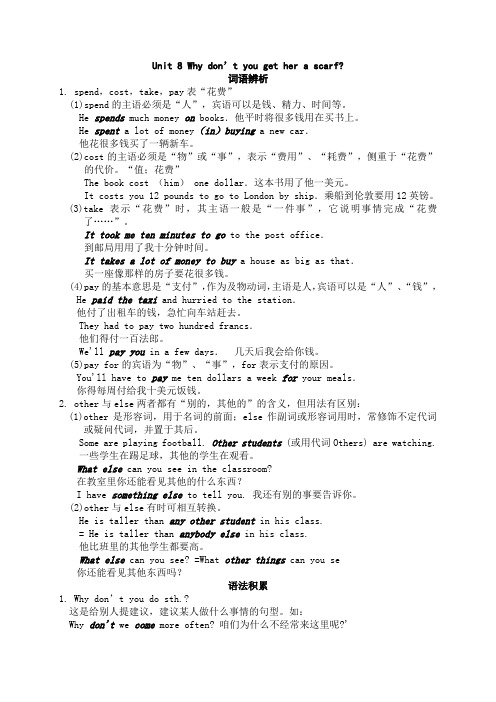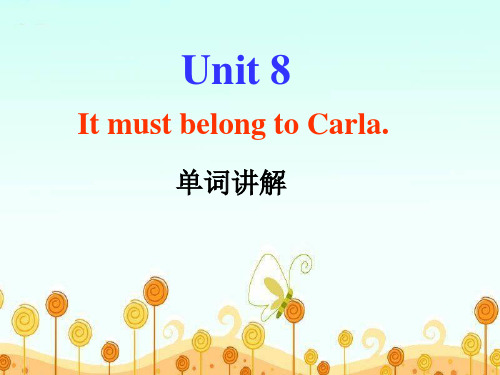Unit 8
- 格式:ppt
- 大小:112.00 KB
- 文档页数:36

Unit8 课文翻译课文AReflectionsof aChinese mother inthe West一位西方华裔母亲得思考1.很多人想了解中国父母就是如何培养出如此成功得孩子得。
她们想知道,为什么这些中国父母能养育出那么多天分极佳得孩子,她们就是否也能培养出这样得孩子呢?2.事实就是,中国父母得做法,对固执己见得西方人来说,令人愤慨,难以想象,甚至就是违法得、中国母亲可以不客气地对正在狼吞虎咽得肥胖孩子说:“喂,小胖子,您要减肥了。
”与此相反,西方父母必须体谅地、小心翼翼而拐弯抹角地谈及“健康”,而且永远都不会提及“胖"字、结果,孩子还就是因为饮食紊乱与消极得自我评价得去求医问药。
长期以来我一直苦思冥想,中国父母这样做就是如何能够全身而退得,我认为中西方得父母之间存在三种意识形态上得差异。
3.首先,我注意到西方父母呵护子女得自尊,使她们免受一切批评。
她们担心孩子失败后得感受,于就是不断尽其所能解除子女得忧虑,而不管其表现如何糟糕。
西方父母认为孩子就是娇弱得,不够坚强,因此她们得行为也就与中国父母大相径庭了。
4.举个例子,如果一个孩子考试得了个Aˉ回家,西方父母很可能会表扬孩子。
而对中国母亲来说, Aˉ根本不算什么好成绩;她还会不快地叹气,问到底出了什么问题。
如果孩子得了B回家,一些西方父母尽管十分不情愿,仍然会表扬孩子。
其她西方父母会表达出不满,但不会质疑孩子得智力,或贸然说孩子“笨蛋”、“一文不值”或“太可恶了”、而私下里,西方父母可能会感到担心,但绝不会让孩子们知道、5.如果中国孩子得了B,不管什么科目,首先面临得就就是一声尖叫与恼怒得爆发、中国母亲会更加不遗余力地找来几十也许几百套得测验题,不惜采取手头任何办法来让自己孩子得成绩提高到A。
6.中国父母要求完美得成绩,因为她们理所当然地认为孩子完全可以做到,而且分数就是比“自尊”更为重要得衡量成功得标准、如果孩子没拿到全A,中国父母就认为这就是因为孩子不够努力。

人教版八年级英语上册Unit8知识点讲解How do you make a banana milk shake?Section A page 571. turn on 打开(电器、龙头等); turn off 关; turn up 调大音量; turn down 调小音量题:① The music is too loud, please the recorder.② We should the lights when we leave the classroom.2. cut up 切碎(代词只能放中间)You have to cut it up.3. pour A into B 把A倒入B中题:Factories waste water the rivers.【拓展】pour 还可以表“下大雨”的意思:It’s pouring outside now.4. put A in B 把A放在B里(静态);put A into B 把A放入B 里(动态)Put the beef, carrots and potatoes in the blender.【拓展】put… on… 把…放到…上面She put the book on the desk.5. make sb. sth. = make sth. for sb. 为某人做某事(用法同buy)She made us coffee. = She made coffee for us.Section A page 581. add A to B 把A添加到B上Please add some salt to the soup.2. 描述做事步骤的词有:First(首先),….Next(紧接着),…Then(然后), ….Finally(最后),…(next和then位置可互换)3. after that 在那之后。
4. How many 多少(接可数名词复数形式);How much 多少(接不可数名词),how much 除了问数量,还可以问价钱。

Unit8 单元知识总结短语归纳1. belong to… 属于……2. hair band 发带3. go to/attend a concert 参加音乐会4. in the music hall 在音乐大厅5. something valuable/unusual 贵重/不寻常的东西6. something strange 奇怪的事情7. at the picnic 在野餐时8. the rest of.... 其余的……9. pick it up 捡起,拾起10. each other=one another 互相,彼此11. nothing much 没什么(事)12. go to a picnic=go for a picnic 去野餐13. anything else 其它的东西14. be interviewed by... 被……采访15. strange noises 奇怪的16. outside our window 在我们的窗外17. next-door neighbor 隔壁邻居18. at first 首先,起初19. run away 逃走20. feel uneasy 感到不安21. have no idea=don’t know 不知道22. a long period of time 很长一段时间23. have fun doing sth. 做某事开心24. create fear制造恐惧1/ 625. There must be …doing sth. 一定有……在做某事26. cough a lot 咳得厉害27. run after 追赶28. run to do sth. 跑着去做某事29. must be dreaming 一定在做梦30. run for exercise 跑步锻炼31. make a movie 拍电影32. wear a suit 穿西服/套装33. express a difference / result 表达差异/结果34. add information 添加信息35. at the same time 同时36. a rock circle 一个石头圈37. the most famous historical places 最著名的历史名胜38. a group of… 一群……39. a bit late 有点晚儿40. communicate with ...与……交流41. so many centuries ago许多世纪前42. point out 指出43. put together 放在一起44. in a certain way 以某种方式45. on midsummer’s morning 在仲夏的上午46. shine directly into… 直接照进……47. the center of ... ……的中心48. move up 上升,提升49. the position of... ……的位置50. burial place 墓地51. a place to honor ancestors祭拜祖先的地方52. celebrate a victory over an enemy庆祝战胜敌人用法集萃1. belong to 属于It must belong to Carla. = It must be Carla's.2. attend a concert参加音乐会(go to concert 去听音乐会)【比较应用】attend 主要指以观众或听众的身份参加婚礼,丧礼,会议或讲座或上课。

Unit 8 Why don’t you get her a scarf?词语辨析1. spend,cost,take,pay表“花费”(1)spend的主语必须是“人”,宾语可以是钱、精力、时间等。
He spends much money on books.他平时将很多钱用在买书上。
He spent a lot of money(in)buying a new car.他花很多钱买了一辆新车。
(2)cost的主语必须是“物”或“事”,表示“费用”、“耗费”,侧重于“花费”的代价。
“值;花费”The book cost (him) one dollar.这本书用了他一美元。
It costs you 12 pounds to go to London by ship.乘船到伦敦要用12英镑。
(3)take表示“花费”时,其主语一般是“一件事”,它说明事情完成“花费了……”。
It took me ten minutes to go to the post office.到邮局用用了我十分钟时间。
It takes a lot of money to buy a house as big as that.买一座像那样的房子要花很多钱。
(4)pay的基本意思是“支付”,作为及物动词,主语是人,宾语可以是“人”、“钱”,He paid the taxi and hurried to the station.他付了出租车的钱,急忙向车站赶去。
They had to pay two hundred francs.他们得付一百法郎。
We'll pay you in a few days.几天后我会给你钱。
(5)pay for的宾语为“物”、“事”,for表示支付的原因。
You'll have to pay me ten dollars a week for your meals.你得每周付给我十美元饭钱。


Module 3 Food and drinkUnit 8 The food we eat知识点梳理I. Useful words and expressions1. I’d like steamed prawns with garlic.这里的with是指将两种东西混在一起。
steam 动词,蒸;在这里用的是它的形容词形式,蒸的。
本单元中还出现几个类似的,如fried(炒的,油炸的),boiled(煮的),baked(烤的)。
2. Let’s have tomato. It’s my favourite.let’s = let us让我们。
let 后接代词宾格,再接动词原形。
favourite在本句中作名词,表示“最喜爱的事或物”。
It’s my favourite. 相当于I like it best.3. Mum, can we have some fruit after dinner, please?和any一样,some也可以用在一般疑问句中,但所表达的意思不同。
当说话人征求对方意见或希望得到对方肯定回答时,一般疑问句中才可以使用some。
类似的句型还有:Would you like some …? Do you want some … ?May I have some …? Shall we have some …?4. OK, but we need to buy some food first!need在该句中为实意动词,need to do sth. 需要做某事。
一般疑问句形式:Do/Does/Did… need to do sth.?否定形式:don’t/doesn’t/didn’t need to do sth.除了need to do sth.之外,也有need sth. 需要某物。
II. Word studyIII. Language explanation1. What would you like for dinner tonight?本句相当于What would you like to have for dinner tonight?would like sth. 想要某物。
人教版九年级英语第八单元Unit 8 Section B 知识点精讲Section B单词1. land /lænd/ v.着陆;降落典例The plane will land in five minutes.飞机将在五分钟后着陆。
反义take off(飞机)起飞拓展land n.陆地They can' t live on land.它们不能在陆地上生活。
2. suit /sju:t/ n.西服;套装v.适合典例a business suit职业装Do you think the color of this suit(n.) suits(v.)me?你认为这套西服的颜色适合我吗?谚语A guest should suit the convenience of the host.客随主便。
3. express /ɪk'spres/ v.表示;表达助记*容易(e)错误(x)地按键(press)来表达自己。
典例to express doubts表示怀疑express accurately准确地表达短语express onese表达某人自己(的思想)联想expression n.表达4. circle /'sɜː (r)kl/ n.圆圈v.圈出典draw a circle(名词)画一个圆圈stand in a circle(名词)站成一圈circle the important words(动词)圈出重要的单词拓展circle v.盘旋5. Britain /'brɪtn/(= Great Britain)大不列颠典例Mark teaches Chinese in Britain.马克在大不列颠教汉语。
联想British n.英国人adj.英国的;英国人的6. receive /rɪ'siv/ v.接待;接受;收到助记re/r/+cei/si/+ve/w/= receive典例receive a letter/present收到一封信/一个礼物receive a phone call接到一个电话辨析receive与acceptreceive指“收到”,着重指行为本身,不管是否接受accept指“接受”,着重指经过考虑以后愿意接受一句辨义The boy has received his present, but he will not accept it. 这个男孩已收到了他的礼物,但他不会接受它的。
Unit8 Have you read Treasure Island yet?知识点归纳一、重点短语1. on page 25 在第2 5 页2. the back of the book 书的背面3. hurry up 赶快;匆忙4. in two weeks 在两周之内5. go out to sea 出海6. an island full of treasures 一个满是宝藏的岛屿7. w rite about 写作关于……的内容8. finish doing sth. 做完某事9. wait for another ship 等待另一艘船到来10. learn to do sth. 学会做某事11. grow fruits and vegetables 种水果和蔬菜12. a few weeks ago 几个星期前13. the marks of another man’ s feet另一个人的脚印14. not long after that 不久之后15. run towards sp. 跑向某地16. use... to do sth. 用……来做某事17. signs left behind by someone 某人留下的标记18. read the newspaper 看报19. science fiction 科幻小说20. can’ t wait to do sth. 迫不及待地做某事21. a good way to wake up 醒来的一个好办法22. number of people 人数23. used to do sth. (过去)常常做某事24. study abroad 在国外学习25. make sb. do sth. 使某人做某事26. come to realize 开始意识到27. ever since then 自从那时起28. the southern states of America美国的南部地区29. belong to 属于30. be kind to each other 善待彼此31. trust one another 互相信任32. the beauty of nature 大自然的美33. have been to sp. 去过某地34. do some research on sth. 对……做研究35. hope to do sth. 希望做某事36. see sb. do sth. 看到某人做某事37. the first line in the song歌曲的第一行38. enjoy success in享受……的成功39. at the end of the day 傍晚的时候二、用法归纳1.finish doing sth 完成做某事2.arrive at/in sw 到达某地3.learn to do sth 学习做某事4.see sb doing sth 看到某人正在做某事 sb sth 给某人取名为.......6.teach sb sth 教某人某事e sth to do 用某物做某事8.love to do/doing sth 喜欢做某事9.can’t wait to do sth 迫不及待做某事10.b e kind to sb 对某人友好11.h ope to do sth 希望做某事12.h ave time to do sth 有时间做某事13.h ave nothing to do 没什么事情可做三、重点句型1. Have you….. yet?— Have you read Little Women yet?你读过《小妇人》吗?— Yes,I have. /N o, I haven’ t.是的,我读过。
九年级Unit 8知识点1.中考之情态动词(1)情态动词① must必须-- mustn't禁止②need必须—needn't不必③ can能——can’t不能过去式:could --couldn't 同义词:be able to --be not able to④may可能——may not不可能⑤ had better do sth最好干某事——had better not do sth最好不干某事⑥shall与I或we连用⑦should应该—shouldn't不应该⑧ will将要——won't将不能过去式would将要——wouldn't将不会⑨ might可能——might not不可能⑩ have to不得不⑪ maybe=perhaps可能(用于句首,副词)may be可能是(用于句中,充当谓语)(2) 考向—(不同时态的推测)①情态动词+动词原形(表示对现在的推测)例1:Something must be wrong with my bike我的自行车一定是出了毛病了例2:At first, I thought that it might be a dog but I couldn’t see a dog or anything else, either 起初,我认为它可能是一只狗。
但我没看到狗,也没看到其他任何东西。
②情态动词+be +doing(表示对现在正发生的事的推测)例3;He might be having breakfast at home他可能正在家吃早饭。
③情态动词+have +done(表示对过去已经完成的事情的推测)例4:I must have put my keys somewhere in the bedroom我一定是把钥匙放在卧室某个地方了例5:I think somebody must have picked it up 我想一定有人已经捡到它了(注意:pick up捡到、拾起)例6:We do know they must have been hard- working ---and great planners.我们的确知道他们定很勤奋---而且是伟大的规划者(3)考向二:There +情态动词+be①There+情动+be+主语+doing有某人正干某事例1:It's noisy, there must be some dogs barking 太吵了,一定有些狗在叫。